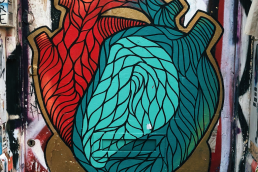By Susan Robinson
Illustration by Rachel Hood
Work is a source of income and routine. It can also provide satisfaction, and be a place of friendships and learning and development. However, sometimes it can be a source of stress and anxiety.
I like my job and have a fair degree of autonomy. But even if you enjoy your job, it can sometimes be a struggle to get up and go into work when you’re suffering from depression.
Here are some of the things that help me to survive working in an office when I’m depressed, many of which I learned the hard way. They may or may not work for you, in your workplace, but they might at least help you to think about what would be useful for you.
- Be as honest as you comfortably can
For years I’ve carried shame and stigma about my mental health and I find it hard to be open about it. I classed the occasional day when I was too depressed to work as “stomach bugs”. I felt a vague sense of pride that I hadn’t had a single day off attributed to depression. I later learned that Human Resources (HR) are (slightly) more forgiving of sick absences related to a long-term health condition.
It was only when HR chased me about my absences that I ended up crying on my manager and telling her about my depression. She was lovely, and didn’t treat me like I was incapable of doing my job. It was one of my fears that people would define me by my depression rather than my skills.
I still feel that, unless someone is in my direct management chain, they don’t need to know about my depression. But I am now more open with my managers, so that I can ask for support if I need it, before things escalate.
- Know your “reasonable adjustments”
If you have a mental health condition which has lasted for, or is likely to last for more than 12 months and has a significant impact on your ability to carry out day to day tasks, then it is likely to be classed as a disability under the Equality Act, and you have the right to ask your employer to make “reasonable adjustments” to help you to stay at work and carry out your job. Even if your condition hasn’t lasted for 12 months, it might still be worth speaking to your employer, as it is in their interest to support you at work and perform to your best ability. They might refer you to occupational health for advice.
It can be hard to think what a reasonable adjustment looks like in relation to mental health. But try and think what would help you. Reasonable adjustments include time off for medical appointments, including mental health appointments.
I struggle with mornings due to the medication I take. My organisation provides flexi-time, so I tend to start work nearer 10am than 9am. When I’m depressed, I can feel overwhelmed and feel like I don’t know what I’m doing (the nasty voice of depression likes to tell me that I’m no good at my job). So I find it helpful to talk to my manager and either ask for more straightforward tasks, or for help breaking down larger pieces of work into more manageable chunks, and checking in regularly to make sure I’m on the right track. When I’m particularly anxious I prefer not to be the only member of my team to attend meetings. Sometimes I’ve had to temporarily reduce my hours, e.g. when dealing with side effects of new medication.
Some people like to work from home. I prefer working in the office, I like to keep work and home separate and being around people can help my mood. But it could be a good option if you feel able to work and want to avoid the commute or not be around people.
I found it hard to ask for some of these things. It felt tantamount to saying “I can’t do my job”, but I eventually learned it’s not saying that. It’s saying that there are occasions when I need some extra support to do my job to the best of my ability. Because I am good at my job (despite what depression likes to tell me).
- Make use of your allies
Think about who your allies/sources of support are and how you can use them. I am fortunate in that I’ve have had good line managers who have been willing to support me, because they value me and my work. However, I know that this is not always the case for everyone. HR might be a source of support (or stress), occupational health services might provide helpful advice.
I’ve had a positive experience with my union representative who supported me through HR processes when off sick and returning to work. I have friends at work outwith my team, and it can be good to chat with them and get their perspective.
Allies can also be outwith work; friends, family or professionals. Whoever your allies may be, it’s good to know who they are, and in what situations they can (and can’t) offer support.
- Find that work/life balance
Work is only part of who we are and what we do. It’s important to take time to do other things you enjoy and engage in self-care. One of my managers had a nice phrase which stuck with me, “we work to live, we don’t live to work”.
I recently slightly reduced my hours to give me more time to do the things that help me stay well. This was a judgement call, balancing the benefits of more time, without overly increasing financial stress by earning less.
During the working day I feel it is important to take breaks. I always get away from my computer at lunchtime. Often I like to read a book and escape into a different world, I swim once a week at lunchtime, and sometimes meet friends for lunch. I also take short breaks during the day, to get water from the kitchen, a snack from the canteen, a quick chat with a colleague etc.
- Take time off if you need it
This one took me a long time to learn. I’m very stubborn and I don’t like to let depression “win”, so I would generally work on until I was really unwell. I didn’t feel like I was ill enough to justify taking time off until I had hit crisis point. And then of course it would take longer to recover, and the absence when it finally came might last for months.
I would feel guilty when I was off, if I went out, what if someone from work saw me and thought I was skiving? But then a worker from the community mental health team gently told me that being off with depression isn’t like being off with the flu where you stay in bed, and that going out for walks, meeting friends, doing things you enjoy are actually an important part of your recovery, and you shouldn’t feel guilty for doing them.
I’ve now learned that it is OK, in fact it is better, to take a few days off when things start to get bad, and doing so might help stop things from escalating. That this is not me letting depression “win”, but it’s me hitting “pause” so that I can better manage my depression. And my managers understand, and would rather I took a couple of days off to manage my mental health, rather than struggle on and become more unwell.
- Be gentle with yourself
After a period of sick leave, I find going back to work anxiety-provoking and exhausting, so I would always recommend doing a phased return and gradually working back up to your full hours, rather than trying to dive straight back in. This is also a good time to call on your allies for support. When I was returning from a long sick absence, I met a work friend on my first day back, and walked into the office with her, which made my initial return feel less stressful. Returning after sick leave is also a good time to think about any reasonable adjustments you might need in the short or longer term to help you settle back into work.
What works for you may well be different from what works for me. It took me a long time to recognise what helps me. If nothing else, I hope this article allows you to consider what might help you not only to survive at work, but reach your full awesome potential (because you are awesome – don’t let depression tell you otherwise!).
Susan Robinson
Susan enjoys creative writing and used to run a writing group in Edinburgh for women with lived experience of mental health issues, who exhibited their writing in the Scottish Mental Health Arts Festival (SMHAF). Susan now runs a writing group at the Ripple Project and has co-written and co-starred in a number of plays in Leith Festival, as well as having stories shortlisted in competitions run by the Health and Social Care Academy and SMHAF. Susan wants to help reduce the stigma around mental health.
Rachel Hood
Rachael Hood is an Edinburgh based artist and designer, whose art practice ebbs and flows between disciplines. She uses storytelling, filmmaking and printmaking to bring to life observations of human behaviour, identity and interaction.









